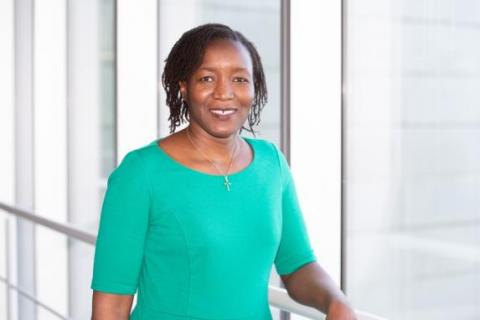
I was born and raised in Zimbabwe. Back then studying or excelling in mathematics was against the societal norm for a girl. However, I had encouragement and support from my mother who herself had broken the societal norm to raise 9 daughters alongside pursuing a career in teaching and eventually establishing a successful retail business. Despite some discouraging remarks from various people including some of my teachers, I felt empowered by my family to continue studying mathematics. It was a subject I enjoyed and a small part of me was determined to prove society wrong.
On completion of my A-levels I became the 1st person in my family to go to university where I majored in mathematics, biology, and education. A single module in mathematical biology sparked my interest in applications of mathematics to solve biology problems. At the time I was not aware or exposed to any career options in this field of study. After graduation, without many options available to me at the time, I took on my 1st job as a high school teacher. With both my parents and 4 of my older sisters also in teaching I wrongly assume this would be an obvious career choice for me. Several months into the job it became apparent to me that I had made the wrong decision. Just as I quit my job, I was fortunate to be offered a scholarship to the African institute of mathematical sciences (AIMS, South Africa) for postgraduate diploma.
My time at AIMS in 2003 mark a turning point for my studies and career choice. I was reintroduced to the field of biomathematics this time with more focus on disease dynamics. In addition, I also gained valuable skills in programming and problem solving. With these new skills and knowledge, I went on to focus on biomathematics with particular interest in HIV infection completing a Master’s in Applied Mathematics from the University of Cape Town in 2005. I went on to complete a PhD in theoretical immunology from the University of Utrecht in the Netherlands. My thesis was on understanding the mechanisms of T cell homeostasis to answer the question: "How long does a T cell live?” Understanding these basic concepts provided a clearer picture of the dynamics of T cells during lymphopenia driven, for example, by HIV infection and T cell dynamics during reconstitution.
On completion of my PhD, I went into academia spending a year as a postdoctoral fellow at the University of Rochester medical centre USA, studying immune responses to influenza A infections. After moving to the UK to join my husband raise a family, I switched into the field of epidemiology and health economics spending a time as a research associate at Imperial College London. An opportunity arose for me to join the civil service working an infectious disease modeller for Public Health England (PHE) and retaining a visiting Research fellow at Imperial College, London. At PHE, alongside caring for my new-born son, I developed mathematical models that are used in the design and evaluation of tuberculosis control strategies with particular focus on social groups with limited access to health care. The work helped to inform public health policy and improve health practices.
Although I enjoyed my worked at PHE, I wanted to explore where else I could apply my skills and experience to make an even bigger impact. Through networking I got exposed to new career options in the pharmaceutical industry eventually transition into the corporate world by Pfizer in 2020. In my current role I focus on bringing vaccines and medicines to patients by demonstrating their health and economics benefits.
To this day it amazes me how the fundamentals of calculus can have such a huge impact in understanding immune responses to infections, the spread and control of infectious diseases and even ensuring vital vaccines and medicines are accessible to those who need them the most.
Throughout my career, flexible working practices have allowed me to have a work-life balance that ensured I could raise my son while working full-time. As a mother with a young child, it is a deal breaker for my choice of employer.
